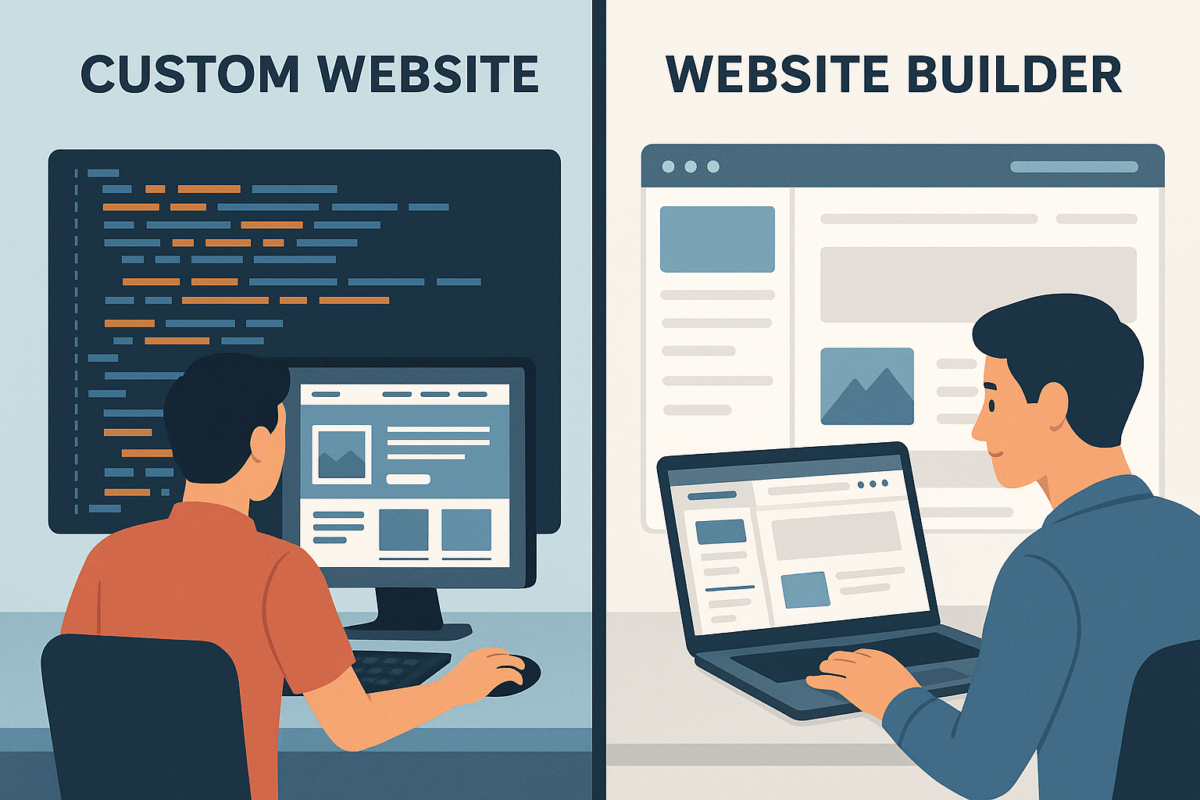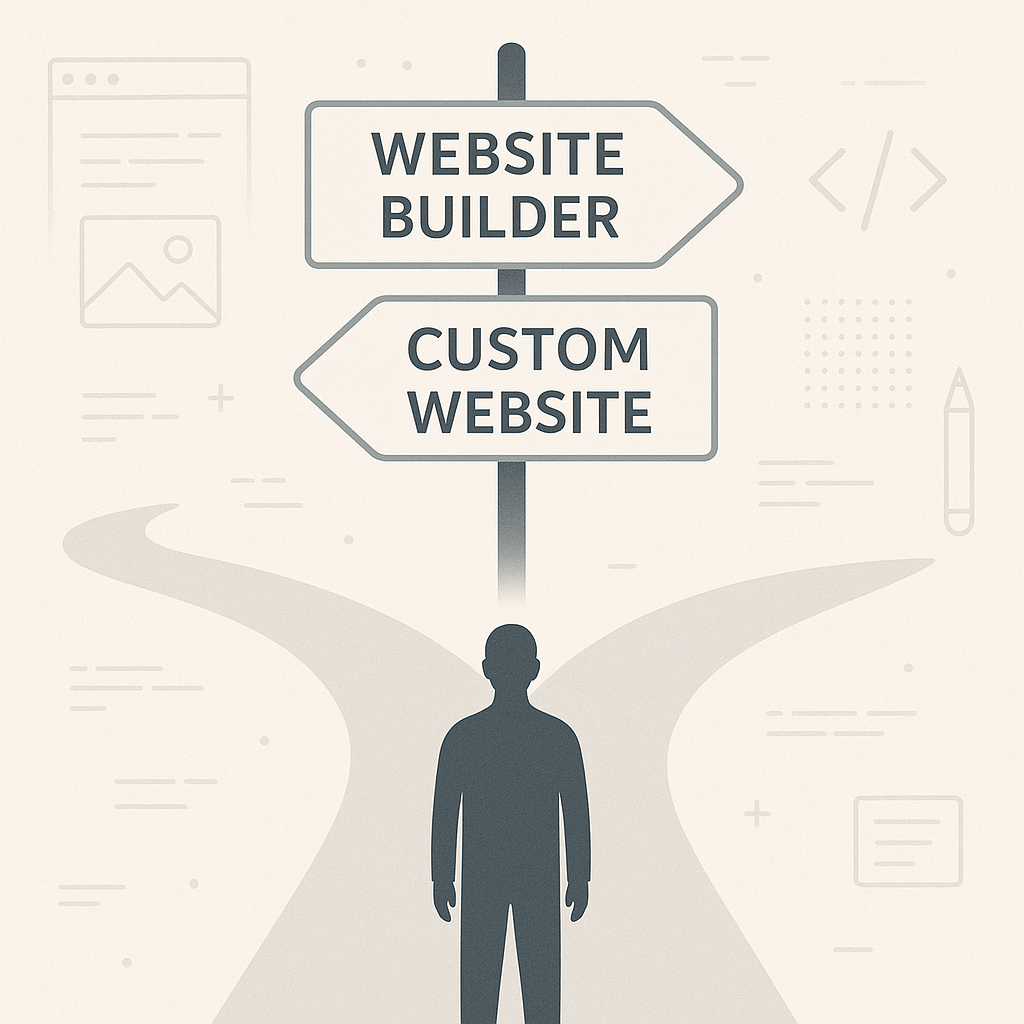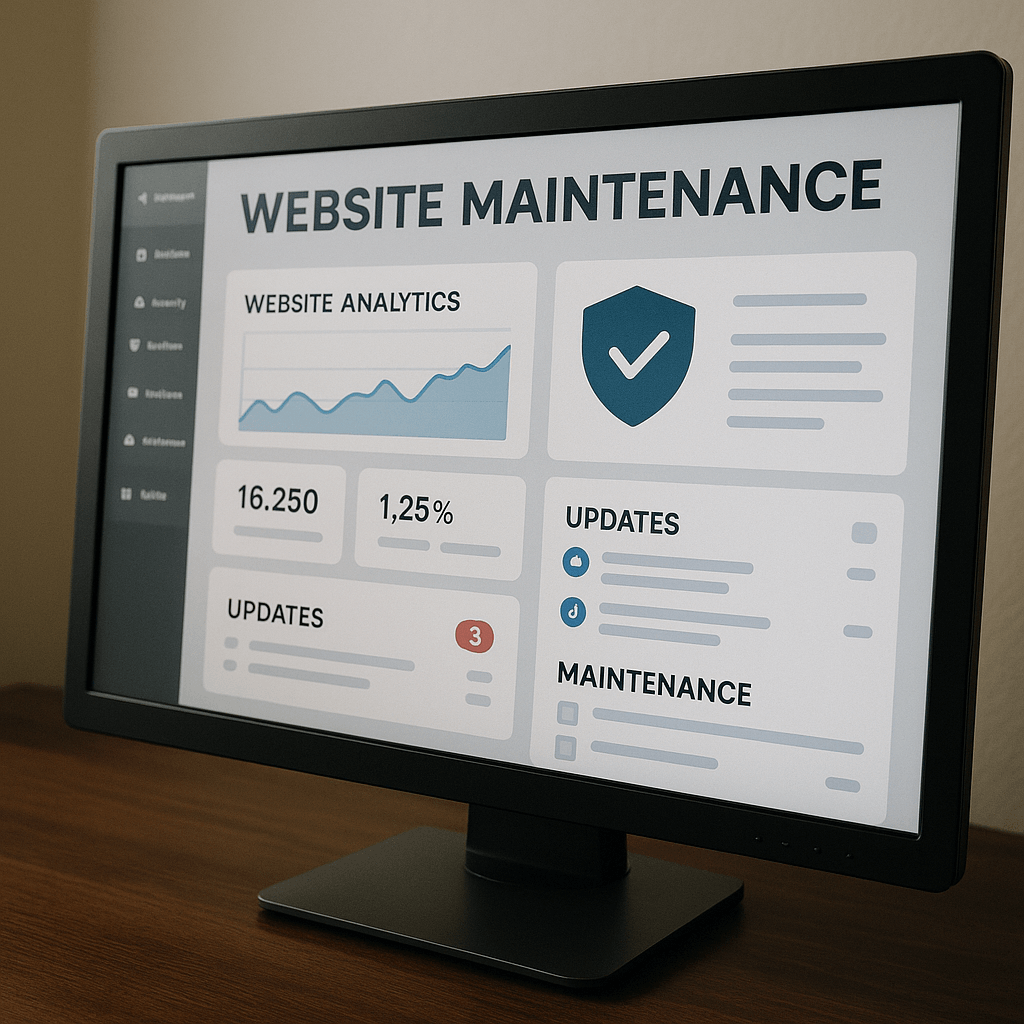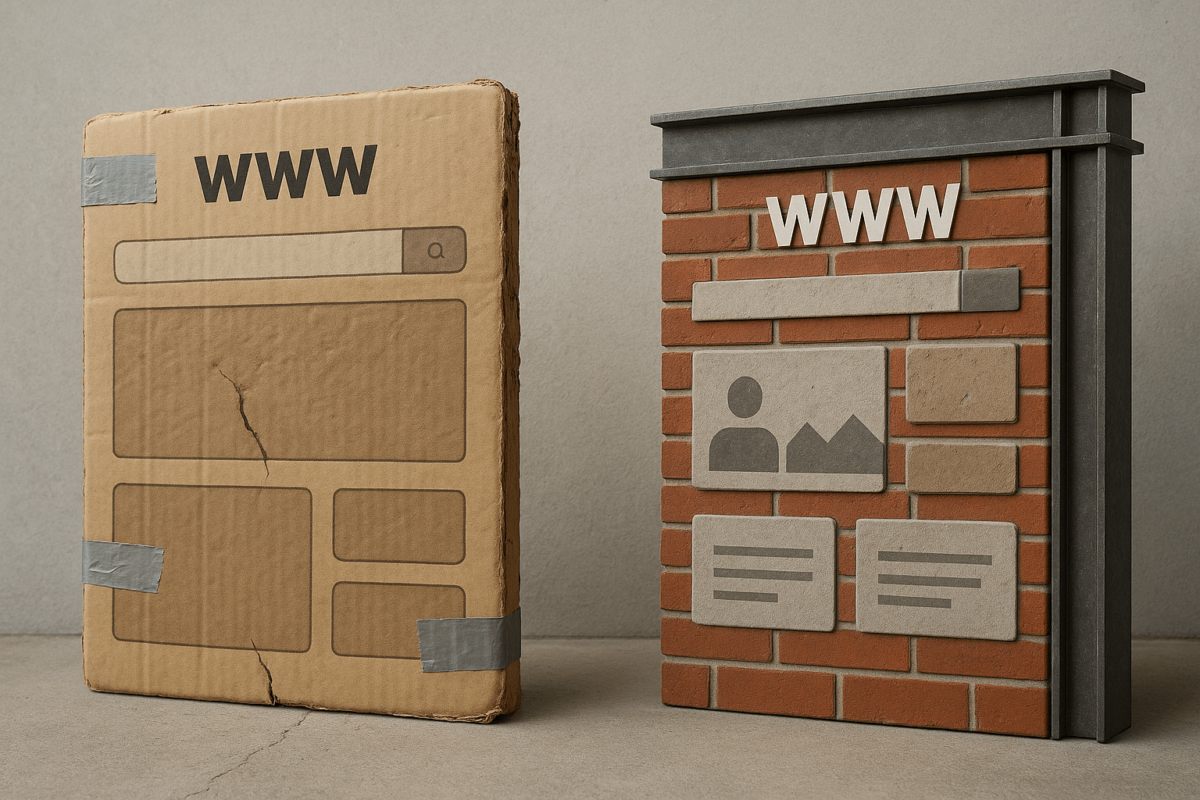Choosing between a custom website and a website builder is a decision based on your needs for flexibility, budget, and scalability—custom sites offer full control and unique design, while builders provide speed and simplicity at a lower cost.
In today’s digital landscape, businesses and individuals alike are faced with the critical decision of how to establish their online presence. The web design choice often boils down to two primary options: using a custom website vs website builder.
Each option has its unique advantages and disadvantages, making it essential to understand the differences, benefits, and scenarios in which one might be more suitable than the other. This article delves into the nuances of custom websites versus website builders, providing insights to help you make an informed decision for your web design needs.
This article is a part of the series of Ultimate Guide to Hiring a Web Designer for Your Small Business Website in 2025.

What is the Difference Between a custom website vs website builder?
Understanding Website Builders
A website builder is a platform that allows users to create a website without any coding knowledge. These tools typically feature a drag-and-drop interface, which simplifies the web design process for individuals who may not be tech-savvy.
Website builders offer a streamlined approach to web development, enabling users to choose from various templates and built-in features to create a professional website quickly. Popular website builders include platforms like Hostinger’s website builder, Wix, and Squarespace, which cater to a wide range of users, from bloggers to small business owners.
Defining Custom Websites
In contrast, a custom website is built from the ground up, tailored specifically to meet the unique needs of a business or individual. This involves custom design and development, allowing for greater flexibility in terms of functionality and aesthetic appeal.
Custom websites are typically created by web designers or developers who possess advanced coding knowledge, enabling them to implement unique features that are not available in standard website builders. This personalized approach ensures that the final product aligns closely with the client’s brand identity and business objectives.
Key Differences in Functionality
When comparing website builders vs. custom websites, one of the most significant differences lies in functionality. While website builders offer a range of built-in features that are easy to use, they may lack the advanced capabilities required for more complex projects.
Custom websites, on the other hand, can incorporate unique functionalities tailored to specific business needs, such as e-commerce solutions, membership systems, or custom databases. Additionally, a fully custom website can be optimized for search engines more effectively, allowing businesses to enhance their online visibility and reach their target audience more efficiently.
When Should You Choose a Website Builder?
Benefits of Using Website Builders
Website builders present numerous benefits, particularly for those looking to create a website quickly and affordably. The user-friendly design interface allows individuals to build a site without any prior experience in web development. Many website builders offer a variety of templates and themes, enabling users to customize their site’s appearance easily.
Furthermore, the built-in features provided by these platforms often include SEO tools, social media integration, and analytics, which can help users track their website’s performance without the need for extensive coding knowledge.
Ideal Scenarios for Website Builders
Website builders are ideal for small businesses, freelancers, or individuals who need a simple online presence without the complexities of custom development. For example, if you are a local bakery looking to showcase your products and provide basic contact information, a website builder can help you create a functional and visually appealing site in a fraction of the time it would take to develop a custom site.
Additionally, for those who require a quick turnaround and have limited budgets, opting for a website builder is often the most practical choice.
I had a case where, within a very short amount of time, I started a business that needed a website quickly. Since I didn’t have time to find a specialist or agency, I used a website builder—and at that moment, it was the right decision, as it saved me a lot of time and money. The website worked perfectly well, especially since it was for a very small business.
Cost-Effectiveness of Website Builders
One of the most compelling reasons to opt for a website builder is the cost-effectiveness it offers. The expenses associated with hiring a web designer or developer for custom web development can be substantial. In contrast, website builders typically operate on a subscription model, allowing users to create a website without incurring hefty upfront costs.
This affordability makes website builders particularly appealing for startups and small businesses that may not have the financial resources to invest in a fully custom website.
From my own experience, I’ve learned that a website builder is a great option if you have a small starting budget or are just launching a small business. Especially for those who have some website-related or coding knowledge, you can use a website builder and later make small changes yourself if needed. This way, you can definitely save a lot of money while still having a perfectly functional website.
What Are the Advantages of Custom Web Development?

Involves Custom Design for Unique Needs
Custom web development involves a tailored approach that addresses the specific needs of a business. Unlike website builders, which often rely on pre-designed templates, a custom website is built to reflect the unique branding and identity of the organization.
This custom design ensures that the site stands out in a crowded marketplace, providing a distinct user experience that aligns with the company’s mission and values. Moreover, custom websites can incorporate unique custom themes that resonate with the target audience, enhancing engagement and loyalty.
One great point I’d like to mention about a custom website is the ability to make it truly unique, as you can include all the features and details you need and choose a design tailored specifically to your business. Website builders often lack advanced options and may not always deliver professional results for larger or more complex businesses. Therefore, if your business requires unique functionality and features, a custom website is likely the better choice.
Enhanced Functionality and Features
Another significant advantage of custom websites is the enhanced functionality they offer. Custom development ensures that the site can accommodate specific features that may not be available through a website builder.
For instance, if a business requires complex e-commerce capabilities, a custom website can be designed to include advanced shopping cart systems, inventory management, and payment processing solutions tailored to the organization’s needs. This level of customization is essential for businesses that anticipate growth and require scalable solutions.
Long-Term Maintenance and Updates
Custom websites also provide the benefit of long-term maintenance and updates. When working with a web design agency or a dedicated developer, businesses can ensure that their website remains up-to-date with the latest technologies and security measures.
This ongoing support is crucial for maintaining the site’s performance and relevance in a rapidly changing digital landscape. In contrast, while website builders may offer some level of support, they often lack the personalized service and technical expertise available through custom web development.
How to Decide Between a Custom Website and a Website Builder?
Assessing Your Coding Knowledge
One of the first steps in deciding between a website builder and a custom website is assessing your coding knowledge. If you possess a strong understanding of coding and web development, you may find that a custom website offers the flexibility and advanced features you desire.
However, if coding is not your strong suit, opting for a website builder may be the more practical choice, allowing you to create a website without any coding knowledge while still achieving a professional appearance.
Evaluating Your Business Needs
Next, it is essential to evaluate your business needs. Consider the purpose of your website and the specific functionalities you require. If your business website is relatively straightforward, with basic informational content and minimal interactivity, a website builder will likely suffice. However, if your business involves complex operations, such as e-commerce or data management, investing in a custom website may be necessary to meet those demands effectively.
Consulting with a Web Designer or Developer
Finally, consulting with a web designer or developer can provide valuable insights into the best option for your specific situation. A professional in web development can assess your requirements, budget, and long-term goals, helping you navigate the website builder vs. custom website debate. Their expertise can guide you toward a solution that aligns with your vision while ensuring that your web design choices are well-informed and strategically sound.
What I would personally advise is to start with a website builder and see how it works, as it might be a good fit for your business. If it doesn’t meet your needs or isn’t done the way you want, you can always turn to a web design agency or a professional for a custom website. However, if your business’s success depends heavily on your website, I would suggest straitly going with a custom website from the start, as it will be perfectly tailored to your business.

What Factors Should You Consider in Web Design Choices?
Importance of User-Friendly Design
Regardless of whether you choose a website builder or a custom website, the importance of user-friendly design cannot be overstated. A website that is easy to navigate and visually appealing encourages visitors to stay longer and engage with your content.
Both website builders and custom web development can achieve user-friendly designs, but the approach may differ. Custom websites allow for more tailored navigation structures and design aspects that cater specifically to user behavior, enhancing overall usability.
Search Engine Optimization Considerations
Search engine optimization (SEO) is another critical factor to consider when making web design choices. Custom websites can be built with SEO best practices in mind, allowing for greater control over meta tags, site structure, and content optimization.
While many website builders offer built-in SEO tools, they may not provide the same level of customization and effectiveness as a custom-built site. A well-optimized website is essential for improving visibility on search engines and attracting organic traffic.
Future Scalability and Growth
Lastly, consider the future scalability and growth of your website. As your business evolves, your website may need to adapt to new functionalities or increased traffic. Custom websites come with the advantage of being designed with scalability in mind, allowing for easier integration of new features and updates. In contrast, while website builders can accommodate some level of growth, they may have limitations that could hinder your ability to expand your online presence effectively.


